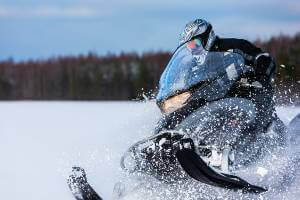Can You File a Snowmobile Crash Claim if You Were Not Wearing a Helmet?
 Winter is almost here, and for some of us that means getting out the snowmobile for some fun in the snow. Unfortunately, when we have fun in our free time, we are often not as focused on safety as we should be. That can lead to risky behavior and some dangerous oversights, such as not wearing a helmet.
Winter is almost here, and for some of us that means getting out the snowmobile for some fun in the snow. Unfortunately, when we have fun in our free time, we are often not as focused on safety as we should be. That can lead to risky behavior and some dangerous oversights, such as not wearing a helmet.
You may think the snow could act as a cushion and keep you from getting hurt. However, the snow will not prevent serious or even life-threatening injuries. Snow is not the only thing to be concerned about either. You could fall off the snowmobile and land on a dangerous object covered in snow, get launched into a tree or strike some other obstacle that is hidden by snow.
If a crash happens because of another’s negligence, you may be eligible to file a claim. However, what happens if you get injured and you were not wearing a helmet?
Below, learn more about snowmobile accident claims involving victims who were not wearing helmets. If you were injured in this type of accident, our snowmobile accident lawyers in Bloomington are prepared to help. Schedule a free consultation where you can get answers to your questions.
State Laws That May Apply
In Minnesota, only those under the age of 18 are required to wear a helmet while riding a snowmobile. However, you cannot simply put on any helmet. The helmet must be approved by the Department of Transportation (DOT). DOT-approved helmets conform to federal vehicle safety standards and generally display the DOT symbol.
The only exception to the requirement to wear a helmet is if the rider is:
- Taking part in a parade
- Operating the vehicle on land that belongs to your parent, grandparent, sibling, uncle or aunt
There may be some confusion as to who is required to wear a helmet. This may be because wearing a helmet is encouraged for everyone by Minnesota’s Department of Natural Resources, not just those who are under the age of 18.
Due to this strong safety recommendation, you may ask: If I was not required to wear a helmet, how could it affect a claim for compensation?
Generally, if you are injured by another person on a snowmobile, a claim is made to their homeowner’s insurance. The insurance company is likely to be looking for ways to deny or at least devalue your claim. By not wearing a helmet, you may put yourself at greater risk for injury and the insurance company will try to use that as justification for lowering the value of your claim.
They may refer to Minnesota’s comparative fault law, which says you can only recover compensation if you are less than 50 percent at fault for your injuries. If you are not more than 50 percent to blame, your final compensation award will be reduced by your percentage of fault. If you are more than 50 percent at fault, you will be barred from receiving compensation for your damages, no matter how injured you are.
However, courts generally prohibit insurance companies from reducing the value of a claim because a victim was more susceptible to injury. In other words, you must take the victim as you find him or her. If you were injured due to another’s negligence, you should be eligible for compensation. Your own negligence may have played a role in your injury, and that can be factored into the value of your claim.
If you think the insurance company is attempting to use the fact you were not wearing a helmet against you, TSR Injury Law may be able to help. We are aggressive negotiators who pursue maximum compensation on behalf of our clients.
Why You Should Always Wear a Helmet on a Snowmobile
Blunt trauma to the head is one of the most common causes of death when riding a snowmobile. That is why protecting your head is so important. It is important to note a helmet may not eliminate all the risks of riding a snowmobile, but without it your risk of a serious head injury increases dramatically.
The main benefit of a helmet is an extra layer of protection around your head. However, there are other features of snowmobile helmets that can help you stay safe. For example, snowmobile helmets have a dual-pane shield to prevent your goggles from fogging up or freezing while you are riding. Some helmets also have insulation to help keep you warm. If you get too cold or cannot see clearly, you are at higher risk of crashing into something.
Call for Experienced Legal Help
At TSR Injury Law, we have helped many personal injury victims in Minnesota recover compensation for their damages – over a billion recovered.
Remember, there is no upfront fee for working with our firm. We are not paid until the end of the legal process and only if we recover compensation on your behalf.
Need legal assistance? Call TSR today: (612) TSR-TIME.



